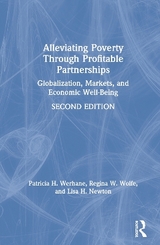
Alleviating Poverty Through Profitable Partnerships
Routledge (Verlag)
978-0-415-80152-2 (ISBN)
- Titel erscheint in neuer Auflage
- Artikel merken
In this book, the authors approach poverty alleviation from an atypical perspective. The thesis is that poverty can be reduced, if not eradicated, both locally and globally, but this will occur only if we change our shared narratives about global free enterprise, and only if we recalibrate our mindsets regarding how poverty issues are most effectively addressed. They argue that poverty amelioration cannot be effected by the traditional means employed during the last century—foreign aid from developed nations and/or from non-profit international organizations. Rather, the authors present evidence which demonstrates that a mindset embracing initiatives developed by global corporations in response to the poverty challenge is significantly more effective. Global companies can alleviate poverty by seizing market opportunities at the Base of the economic Pyramid (BoP) with the implementation of three key processes: moral imagination, systems thinking, and deep dialogue.
This approach to alleviating poverty offers some powerful ideas backed by the support of some of the leading Business Ethics minds in the United States. These scholars, some of whom are on the author team, have created a book that is unique and provocative yet still ideal for courses at the undergraduate level.
Patricia H. Werhane is the Peter and Adeline Ruffin Chair of Business Ethics and Senior Fellow at the Olsson Center for Applied Ethics in the Darden Graduate School of Business Administration at the University of Virginia and also hold a joint appointment as the Callista Wicklander Chair of Business Ethics and Director, Institute for Business and Professional Ethics, at DePaul University. She has been a Rockefeller Fellow at Dartmouth College, an Arthur Andersen Fellow at the Judge Institute, Cambridge University, and Erskine Visiting Fellow at the University of Canterbury in New Zealand. She is the founding editor of Business Ethics Quarterly. Scott P. Kelley is Assistant Vice-President for Vincentian Scholarship in the Office of Mission and Values at DePaul University. He has also served as a research fellow at the Institute for Business and Professional Ethics and as Visiting Assistant Professor in the Department of Religious Studies, teaching courses in Business Ethics. He has taught in Tokyo, Japan and Pohnpei, Micronesia. Laura P. Hartman is a Professor of Business Ethics and Legal Studies in the Management Department at DePaul University’s College of Commerce and is also Research Director of DePaul’s Institute for Business and Professional Ethics. She has served as the Gourlay Professor at the Melbourne Business School/Trinity College at the University of Melbourne (2007-2008), as an invited professor at INSEAD (France), HEC (France), the Université Paul Cezanne Aix Marseille III and at the Grenoble Graduate School of Business, among other European universities. Dennis J. Moberg holds the Gerald F. and Bonita A. Wilkinson Chair of Management and Ethics in the Leavey School of Business and Administration at Santa Clara University. He is also a Scholar in the Markkula Center for Applied Ethics at SCU and a Visiting Professor at the Naval Postgraduate School in Monterey, California (2007-8).
Introduction 1. World Poverty in the 21st Century 2. Failed Strategies in the Alleviation of Poverty 3. Mental Models and Contributing Biases on Global Poverty 4. Narratives of Multinational For-Profit Enterprises and Corporate Social Responsibility 5. Global Poverty and Moral Imagination 6. Institutional Barriers, Moral Risk and Transformative Business Ventures 7. Public-Private Partnerships and other Hybrid Models for Poverty Alleviation 8. Future Prospects for Profitable Partnerships
| Zusatzinfo | 7 Line drawings, black and white; 4 Tables, black and white |
|---|---|
| Verlagsort | London |
| Sprache | englisch |
| Maße | 178 x 254 mm |
| Gewicht | 522 g |
| Themenwelt | Wirtschaft ► Betriebswirtschaft / Management ► Marketing / Vertrieb |
| Wirtschaft ► Betriebswirtschaft / Management ► Unternehmensführung / Management | |
| ISBN-10 | 0-415-80152-4 / 0415801524 |
| ISBN-13 | 978-0-415-80152-2 / 9780415801522 |
| Zustand | Neuware |
| Haben Sie eine Frage zum Produkt? |
aus dem Bereich



